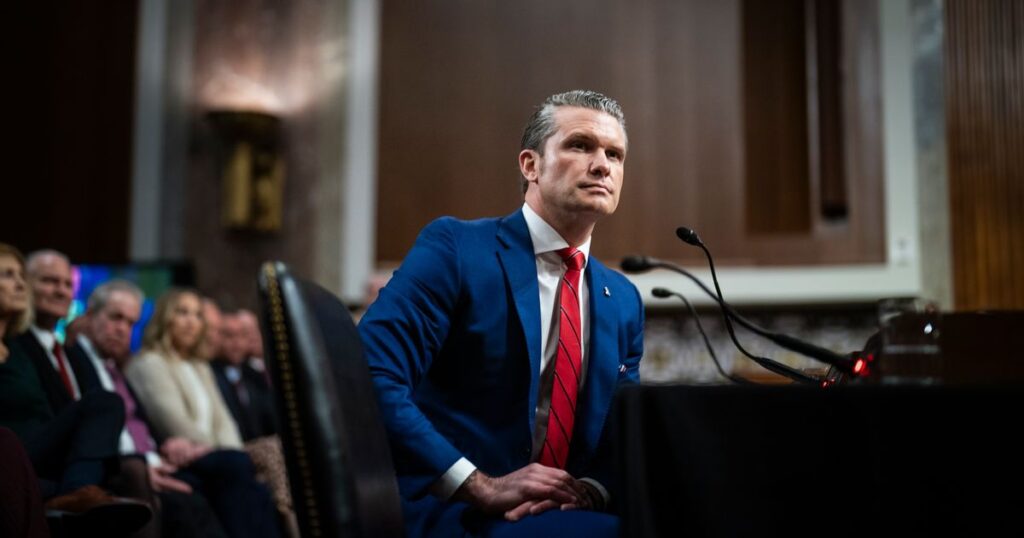### Pete Hegseth’s Controversial Views on Women in Combat
In the lead-up to his confirmation as Donald Trump’s Defense Secretary, Pete Hegseth’s views on women in combat were already well-documented. In his 2024 book, *The War on Warriors*, Hegseth expressed a belief that women, being “life-givers,” should not serve in military combat roles. He stated, “Dads push us to take risks. Moms put the training wheels on our bikes. We need moms. But not in the military, especially not in combat units.” During a November appearance on *The Shawn Ryan Show*, he reiterated this stance, saying, “I’m straight up just saying we should not have women in combat roles. It hasn’t made us more effective, hasn’t made us more lethal — has made fighting more complicated.” Despite attempts to recast his remarks as concerns about military “standards,” Hegseth’s earlier statements reveal a deeper sentiment toward gender roles in combat.
### Mixed Reactions from Senators
Hegseth indicated that the contributions of Senators Tammy Duckworth and Joni Ernst, both of whom are veterans, were “indispensable,” further arguing that his comments concerned maintaining uniform standards within the military. However, his long-standing promotion of traditional gender roles and a perception of women as less suitable for combat raises skepticism. Although he has shifted his views before—having initially opposed Trump’s candidacy for president in 2016—Hegseth’s opinions on gender are likely rooted in his conservative Christian beliefs.
### Hypocrisy and Personal Life
Critics of Hegseth may label him a hypocrite, given his history of infidelity impacting his three marriages, which contrasts with his declared morals regarding women. Adultery, traditionally seen as a sin, aligns with an ideology that undermines women’s value, suggesting they are easily replaceable and expendable. Following accusations of wrongdoing in 2017, Hegseth dismissed claims from one woman, exemplifying a troubling narrative that protects men while silencing women.
### Political Backing and Accountability
During his confirmation hearing, Republican senators lauded Hegseth for his narrative of “Christian redemption,” with Senator Tim Kaine challenging him on his past infidelities. While Kaine pressed Hegseth on his commitment to fidelity, other Republican senators focused primarily on his comments regarding women in military roles. Senator Kirsten Gillibrand articulated doubts about Hegseth’s ability to adequately support women in the military, stressing that his perspective must evolve significantly to do his job effectively.
### Ideological Pressures Within the GOP
Senator Joni Ernst, a former National Guard commander and sexual-assault survivor, showed initial ambivalence about Hegseth but later expressed her support during the hearing, despite being reportedly targeted by ads and social media pressure from Iowa Republicans. Ernst’s vote reflected her deep-rooted conservativism and allegiance to Trump, demonstrating an ideological alignment that is at odds with the pursuit of women’s liberation.
### The Role of Women in Hegseth’s Narrative
As Hegseth and his backers frame the discussion, women are cast in restrictive roles—valued only as mothers and supporters. Senator Markwayne Mullin’s remarks to Hegseth’s wife exemplify this view, praising her as a redemptive figure for Hegseth’s past mistakes. This perspective reinforces the idea that women exist primarily to uplift men, reinforcing traditional gender norms rather than challenging them.
### The Ongoing Fight for Women’s Equality
Hegseth’s comments and support within the GOP signal a disturbing trend toward anti-feminist sentiments that could undermine the progress made in women’s rights. His rise within the Pentagon represents a broader struggle against societal norms that seek to limit women’s roles to motherhood and domestic spheres. While he may articulate support for women veterans, the underlying theme of his beliefs reflects a commitment to maintaining a patriarchal status quo that seeks to define women narrowly as caregivers. Empowering women means acknowledging their complexity beyond these outdated roles and ensuring that their contributions—military or otherwise—are recognized as equally essential to society.


